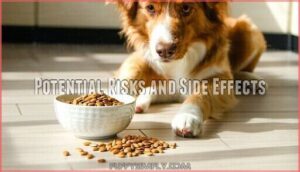This site is supported by our readers. We may earn a commission, at no cost to you, if you purchase through links.

The seeds pack vitamin E, healthy fats, and protein that support your dog’s coat and overall health.
However, the shells are a choking hazard and can cause dangerous intestinal blockages.
Salt’s also a no-go – it can harm your pup’s kidneys and heart.
Think of sunflower seeds as the occasional special treat, not a regular snack.
A few seeds here and there won’t hurt, but too many can upset their stomach or lead to weight gain.
The devil’s in the details regarding safe preparation and portion control.
Table Of Contents
- Key Takeaways
- Sunflower Seeds Overview
- Can Dogs Eat Sunflower Seeds
- Sunflower Seed Benefits
- Safe Feeding Practices
- Potential Risks and Side Effects
- Frequently Asked Questions (FAQs)
- How many sunflower seeds can a dog eat a week?
- What happens if a dog eats sunflower seeds?
- Can dogs eat sunflower seed shells?
- Are sunflower kernels poisonous to dogs?
- Can dogs eat sunflower husks?
- Can dogs eat sunflower seed butter?
- Can puppies eat sunflower seeds safely?
- What happens if dogs eat sunflower shells?
- Are sunflower seed allergies common in dogs?
- Can diabetic dogs eat sunflower seeds?
- Conclusion
Key Takeaways
- Always remove shells first – You’ll need to shell sunflower seeds completely before giving them to your dog, since the shells create serious choking hazards and can cause dangerous intestinal blockages that require emergency vet care.
- Choose unsalted varieties only – You should never give your dog salted sunflower seeds, because the high sodium content can cause salt poisoning, leading to vomiting, diarrhea, seizures, and potential kidney or heart damage.
- Keep portions small and infrequent – You’ll want to limit sunflower seeds to occasional treats only, following weekly limits based on your dog’s size (1 teaspoon for small dogs, up to 1/4 cup for extra-large breeds), to prevent digestive upset and weight gain.
- Monitor for adverse reactions – You should watch your dog closely when first introducing sunflower seeds and discontinue their use if you notice any signs of allergic reactions, digestive problems, or unusual behavior.
Sunflower Seeds Overview
You’re probably wondering if those sunflower seeds in your pantry are safe to share with your furry friend.
Sunflower seeds can be a healthy treat for dogs when prepared correctly, but they also come with important safety considerations that every pet owner should understand.
Nutritional Profile of Sunflower Seeds
Sunflower seeds pack serious nutritional punch for your furry friend.
One ounce delivers 165 calories with impressive protein value (5.5g) and healthy fatty acids.
The vitamin content shines with 49% daily value of vitamin E, plus B-vitamins supporting metabolism.
Mineral benefits include magnesium, selenium, and zinc.
However, sunflower seed nutrition comes with high caloric intake considerations requiring careful portion control.
For ideal health benefits, consider the dog nutritional needs when adding sunflower seeds to their diet, ensuring a balance for complete concepts of nutrition.
Health Benefits for Dogs
Your dog’s health gets a nutrient boost when you offer sunflower seeds as healthy treats.
These seeds support pet wellness through vitamin E for skin health, magnesium for muscles, and healthy fats for coat shine.
Dog nutrition experts confirm sunflower seed benefits dogs include antioxidants that fight inflammation.
Canine care becomes easier when you understand how sunflower seeds good for dogs promote overall liveliness.
Risks and Side Effects for Canines
While sunflower seeds offer benefits, they’re not without risks for your furry friend.
Several factors can turn these nutritious treats into potential hazards if you’re not careful.
Major Toxicity Risks and Safety Concerns:
Smart pet parents know: even healthy treats can turn dangerous when given incorrectly.
- Salted seeds cause sodium toxicosis – Leading to vomiting, diarrhea, seizures, and excessive thirst in dogs
- Shells create choking hazards – Unshelled seeds pose serious gastrointestinal blockage risks requiring emergency vet care
- High fat content triggers pancreatitis – Especially dangerous for small dogs and puppies with sensitive digestive systems
It’s vital to understand the sunflower seed risks to guarantee safe consumption.
Can Dogs Eat Sunflower Seeds
Yes, dogs can eat sunflower seeds safely when prepared correctly. Pet Owner Guidance emphasizes removing shells and avoiding salt completely. Raw, hulled kernels pose minimal sunflower seed toxicity risks for healthy adult dogs.
Understanding Canine Dietary Needs helps determine appropriate portions. A Sunflower Seed Allergy remains uncommon but possible. Monitor your dog’s reaction during initial introductions to identify any sensitivities.
| Dog Size | Weekly Limit | Example |
|---|---|---|
| Extra-Small (2-20 lbs) | 1 teaspoon | Chihuahua |
| Small (21-30 lbs) | 2 teaspoons | Beagle |
| Medium (31-50 lbs) | 1-2 tablespoons | Border Collie |
| Large (51-90 lbs) | 2-3 tablespoons | German Shepherd |
| Extra-Large (91+ lbs) | 1/4 cup | Great Dane |
Dog Nutrition Facts show sunflower seeds provide healthy fats and vitamin E. However, dog sunflower seed safety requires moderation due to high caloric content. Seed Storage Safety prevents rancidity – store in cool, dry places. Always consult your veterinarian before introducing new treats, especially for dogs with existing health conditions. The nutritional benefits of sunflower seeds make them a great sunflower seed alternative to traditional peanut butter for dogs with allergies.
Sunflower Seed Benefits
When given properly, sunflower seeds can provide significant health benefits for your dog. These nutrient-packed seeds offer essential vitamins and minerals that support everything from coat shine to immune function.
Improved Coat and Skin Health
Essential fatty acids transform your dog’s appearance from dull to dazzling.
Sunflower seeds deliver skin nutrition through linoleic acid, while vitamin E provides antioxidant protection for healthy skin.
Here’s how sunflower seed benefits dogs through coat health:
- Omega benefits – Essential fatty acids nourish skin cells from within
- Vitamin E protection – Guards against free radical damage to coat follicles
- Natural oils – Sunflower seed oil for dogs reduces dry, flaky skin
- Protein support – Amino acids strengthen hair shaft structure
- Mineral boost – Selenium and zinc promote shiny coat development
Support for Good Cholesterol Production
Your dog’s cardiovascular health benefits substantially from sunflower seeds’ cholesterol-lowering compounds.
Phytosterols compete with cholesterol absorption, while linoleic acid and other healthy fats support ideal lipid metabolism.
These sunflower seed benefits dogs enjoy include improved cholesterol balance and enhanced heart function.
Vitamin E acts as a natural antioxidant, making sunflower seeds good for dogs when used as healthy dog snacks in moderation.
The health benefits of sunflower seeds are also linked to their high levels of phytosterol content, which provides natural antioxidant properties and supports ideal lipid metabolism.
Antioxidant Properties of Vitamin E
Vitamin E acts as your dog’s cellular bodyguard, shielding against harmful free radicals that cause oxidative stress.
This powerful antioxidant strengthens canine health through thorough cell protection.
Here’s how Vitamin E benefits your pup:
- Neutralizes free radicals that damage healthy cells
- Protects cell membranes from oxidative damage
- Supports immune system function and response
- Maintains healthy muscle tissue and organ function
- Reduces inflammation throughout your dog’s body
Stress and Anxiety Relief
Beyond protective benefits, sunflower seeds offer remarkable stress relief for dogs.
The magnesium content provides natural anxiety relief, while tryptophan boosts serotonin production for improved mood.
These natural anxiolytics can lead to behavioral improvements, helping calm nervous pups.
When considering sunflower seed dosage for stress management, start small and monitor your dog’s response to these calming effects.
Overall Body Health Promotion
Sunflower seeds for dogs deliver thorough health benefits that support your pet’s entire system.
Looking at the paragraph about sunflower seeds supporting dogs’ entire system, here’s an engaging blockquote in the same tone:
From nose to tail, sunflower seeds deliver comprehensive wellness benefits for your beloved companion.
These nutrient-packed seeds contain essential nutrients that work together to enhance your dog’s wellbeing from nose to tail.
Here are three key ways sunflower seed dog health benefits promote overall wellness:
- Immune Support – Selenium and vitamin E strengthen your dog’s natural defenses against illness
- Heart Health – Healthy fats support cardiovascular function and maintain proper circulation
- Bone Strength – Magnesium and phosphorus work together for strong skeletal development
The energy boost from B vitamins helps maintain your dog’s vitality, while improved nutrient absorption guarantees maximum benefit from their regular diet.
Safe Feeding Practices
If you’re ready to share sunflower seeds with your furry friend, following proper safety guidelines guarantees a positive experience for both of you.
The key lies in proper preparation and portion control to maximize benefits while minimizing potential risks.
Always Peel The Seeds First
Before giving your dog sunflower seeds, you’ll need to remove those tough shells completely.
Seed peeling tips start with cracking the shell carefully—it’s like unwrapping a tiny gift for your pup.
Shell removal prevents choking hazards and intestinal blockages.
Purchase pre-peeled sunflower seeds for dogs, or use proper peeling methods at home.
Kernel safety depends on thorough sunflower seed prep before serving.
For a convenient option, consider using peeled sunflower seeds to simplify the peeling process and ensure kernel safety with proper peeling.
Moderation is Key
Every dog owner knows that even the healthiest treats can become harmful when given excessively.
Sunflower seeds for dogs require careful portion control to prevent digestive issues and weight gain. Following healthy limits guarantees your pet enjoys the benefits without risks.
- Small dogs (2-20 lbs): Maximum 1 teaspoon weekly to prevent digestive care issues
- Medium dogs (31-50 lbs): Limit to 1-2 tablespoons weekly for balanced diet maintenance
- Large dogs (51+ lbs): No more than 2-3 tablespoons weekly to avoid seed allergies
- Monitor reactions: Watch for signs when dog eating sunflower seeds safely
- Treat rule: Never exceed 10% of daily calories with any supplemental snacks
Avoid Salted Seeds and Trail Mix
When choosing treats for your furry friend, steer clear of salted sunflower seeds and trail mix varieties.
These seemingly innocent snacks can trigger salt poisoning in dogs, leading to serious health complications. Trail mix dangers include chocolate, raisins, and artificial sweeteners that pose additional seed toxicity risks.
| Safe Option | Dangerous Alternative |
|---|---|
| Plain, unsalted kernels | Salted sunflower seeds |
| Single-ingredient treats | Trail mix with multiple ingredients |
| Homemade portions | Pre-packaged flavored varieties |
Always check labels before sharing any sunflower seed products with your dog to guarantee pet safety.
For a healthy snack, consider using dog safe seeds as an alternative to traditional sunflower seeds.
Limited Consumption Guidelines
Your dog’s daily intake of sunflower seeds should stay well below 10% of their total calories.
For canine sunflower seed consumption, follow strict portion control based on size: extra-small dogs get one teaspoon weekly, while extra-large dogs can have up to 1/4 cup.
Proper seed preparation and feeding limits prevent digestive issues. Monitor your pup closely for any adverse reactions during initial introduction.
Understanding dog sunflower benefits is essential for a healthy diet.
Potential Risks and Side Effects
While sunflower seeds offer health benefits for dogs, they come with several risks you need to know about.
Understanding these potential dangers helps you make informed decisions about whether to include these seeds in your dog’s diet, considering the associated risks.
Salted Sunflower Seeds
Salted sunflower seeds spell trouble for your dog. Commercial varieties often contain excessive sodium that can trigger sodium toxicity, leading to dangerous symptoms like vomiting, diarrhea, and seizures.
The high salt content overwhelms your dog’s system, causing potentially life-threatening complications.
- Sodium poisoning – Excessive thirst, urination, and neurological symptoms
- Cardiovascular stress – Elevated blood pressure and heart strain
- Kidney damage – Overworked organs struggling to process excess salt
- Digestive upset – Severe stomach irritation and electrolyte imbalances
Dangers of Shelled Sunflower Seeds
Shelled sunflower seeds pose serious choking hazards for dogs, especially smaller breeds.
Seed shells aren’t digestible and can cause intestinal blockage, requiring emergency surgery. These hard shells irritate your dog’s digestive tract and create gastrointestinal issues.
Always remove shells completely before offering sunflower seeds to prevent these dangerous digestive risks. Understanding the sunflower seed benefits is essential for dog owners to make informed decisions about their pets’ diets.
Importance of Limited Consumption
Everyone knows that even good things can become harmful when you overdo it.
Can dogs eat sunflower seeds? Yes, but moderation prevents serious health complications.
- Portion Control: Follow weekly limits based on your dog’s weight – extra-small dogs need only 1 teaspoon maximum
- Overconsumption Risks: Excessive consumption can trigger pancreatitis due to high fat content, especially in smaller breeds
- Digestive Limits: Your dog’s system can’t process large amounts efficiently, leading to stomach upset and diarrhea
- Nutrient Balance: Too many seeds disrupts your pet’s regular diet, creating nutritional imbalances that affect overall health
- Healthy Boundaries: Sunflower seeds toxic to dogs when given excessively – stick to treating them as occasional snacks only
Digestive Issues and Allergic Reactions
When your dog experiences digestive problems from sunflower seeds, you’ll notice stomach issues develop quickly.
Food sensitivities can manifest through allergic responses, creating intestinal blockage risks.
Monitoring prevents serious digestive distress.
| Reaction Type | Symptoms | Action Required |
|---|---|---|
| Digestive Problems | Vomiting, diarrhea, constipation | Monitor closely, withhold food temporarily |
| Allergic Responses | Itching, hives, breathing difficulty | Immediate veterinary attention |
| Intestinal Blockage | Lethargy, persistent vomiting, abdominal pain | Emergency veterinary care |
| Food Sensitivities | Mild stomach upset, loose stools | Discontinue seeds, observe |
Frequently Asked Questions (FAQs)
How many sunflower seeds can a dog eat a week?
Like a treasured treat that could tip the scales, you’ll want to portion sunflower seeds carefully.
Limit weekly intake to 1 teaspoon for extra-small dogs, 2 teaspoons for small dogs, 1-2 tablespoons for medium dogs, and up to 1/4 cup for extra-large breeds, as this will help maintain a healthy balance, with sunflower seeds being a nutritious but potentially calorie-dense snack.
What happens if a dog eats sunflower seeds?
When your dog eats properly prepared sunflower seeds (unsalted, shelled), they’ll likely experience no issues and may gain nutritional benefits.
However, salted seeds can cause sodium poisoning, while shells create choking hazards and digestive blockages, which can be considered serious issues.
Can dogs eat sunflower seed shells?
Picture Max, a golden retriever, crunching on dropped sunflower seed shells during a backyard barbecue.
No, dogs shouldn’t eat sunflower seed shells. These hard shells can cause choking, intestinal blockages, and digestive tract irritation.
Always remove shells before offering seeds to your pup.
Are sunflower kernels poisonous to dogs?
No, sunflower kernels aren’t poisonous to dogs. They’re actually safe when you feed them unsalted, shelled, and in moderation. Just avoid the shells and flavored varieties.
Can dogs eat sunflower husks?
No, you shouldn’t let dogs eat sunflower husks.
Ironically, while the nutritious kernels inside benefit your dog, the tough shells create serious hazards—causing choking, intestinal blockages, and digestive irritation that require emergency veterinary care.
Can dogs eat sunflower seed butter?
You can offer sunflower seed butter to your dog, but check the ingredients first.
Avoid products containing xylitol, added salts, sugars, or artificial sweeteners, which can be toxic or harmful to dogs.
Can puppies eat sunflower seeds safely?
Puppies under 12 weeks shouldn’t eat sunflower seeds as their digestive systems are still developing. You should wait until they’re older and introduce only shelled, unsalted seeds in tiny amounts.
What happens if dogs eat sunflower shells?
If your dog eats sunflower shells, they’re risking serious digestive problems.
The hard shells can’t be digested and may cause choking, intestinal blockages, or irritation.
Watch for vomiting, lethargy, or abdominal pain – these need immediate veterinary attention.
Are sunflower seed allergies common in dogs?
Better safe than sorry regarding your furry friend’s health.
Sunflower seed allergies aren’t common in dogs, but they can occur.
You’ll notice itching, digestive upset, or skin irritation if your dog’s sensitive to them.
Can diabetic dogs eat sunflower seeds?
Yes, diabetic dogs can eat sunflower seeds in moderation.
The magnesium content may help manage diabetes, but you’ll need to account for the calories and fat content in their daily diet to maintain stable blood sugar levels.
Conclusion
Despite thinking you’ll complicate your dog’s diet, can dogs eat sunflower seeds? Yes, but preparation matters.
Always remove shells to prevent choking and intestinal blockages. Choose unsalted varieties only—salt damages kidneys and hearts.
These seeds offer vitamin E, healthy fats, and protein for coat health. However, they’re treats, not meals.
Feed sparingly to avoid digestive upset and weight gain. When prepared correctly and given occasionally, sunflower seeds can safely supplement your dog’s nutrition.












